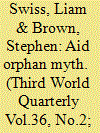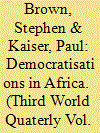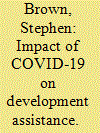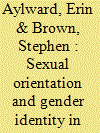|
|
|
Sort Order |
|
|
|
Items / Page
|
|
|
|
|
|
|
| Srl | Item |
| 1 |
ID:
137727


|
|
|
|
|
| Summary/Abstract |
The term ‘aid orphan’ refers to a developing country forgotten or abandoned by the development community. This metaphor has featured prominently in the development assistance policy and research literature over the past decade. Development practitioners, policy makers and researchers have defined aid orphans in manifold ways and often expressed concern over the potential fate or impact of such countries. In this paper we first examine the many definitions of aid orphans and then review the main concerns raised about them. Next we empirically examine more than 40 years of bilateral aid data to identify aid orphan countries and their common characteristics. Our findings suggest that very few countries meet the definition of aid orphan and fewer still raise the concerns collectively expressed about the orphan phenomenon. We conclude by suggesting researchers and practitioners abandon the orphan metaphor and instead focus on issues of equitable aid allocation.
|
|
|
|
|
|
|
|
|
|
|
|
|
|
|
|
| 2 |
ID:
112126


|
|
|
|
|
| Publication |
2012.
|
| Summary/Abstract |
This article examines the demand for criminal accountability for the atrocities committed after Kenya's contested December 2007 elections. It explains why, despite strong popular desire for accountability through prosecutions and the threat of and actual International Criminal Court (ICC) involvement, the government has failed to take concrete steps to try those believed primarily responsible. The article argues that the fundamental reason why the government has not initiated systematic prosecutions in regular domestic courts - or created, as promised, a hybrid national/international tribunal - is that those in charge of establishing these processes are, in many cases, those whom it would prosecute or their close allies. A hybrid tribunal now seems unlikely and credible national trials are an improbable alternative, though there are some reasons to be more optimistic following the new constitution of 2010. For the time being only international justice, which is beyond the government's reach, can achieve a breakthrough in criminal accountability, albeit in a very limited way.
|
|
|
|
|
|
|
|
|
|
|
|
|
|
|
|
| 3 |
ID:
078854


|
|
|
|
|
| Publication |
2007.
|
| Summary/Abstract |
This article focuses on four sub-Saharan countries that offer different insights into postcolonial democratic experiences on the continent. Botswana has enjoyed decades of uninterrupted multiparty politics (but single-party rule) under a political system that mixes Western-style liberal democracy with traditional top-down structures. Benin has democratised rapidly and relatively successfully after a long period of dictatorial rule, providing a transition model for several other African countries. Kenya's former ruling party reluctantly permitted a multiparty system in 1991, but resisted further democratisation and remained in power for another decade by manipulating (at times violently) the transition process. In Burundi democracy was severely undermined in 1993, when army extremists assassinated the first freely elected president, sparking waves of retributional 'ethnic' violence that have recently subsided, but not yet ended, despite positive developments in the political transition process. After presenting these cases, the authors explore competing explanations for success and failure in democratic transitions and survival by focusing on voluntaristic and structural factors particularly relevant to the continent. The comparative case study approach, supplemented by these thematic investigations, allows the authors to consider the continent's grave impediments to democratisation and how they might be overcome, as well as to critically evaluate alternatives to the dominant Western model of liberal democracy.
|
|
|
|
|
|
|
|
|
|
|
|
|
|
|
|
| 4 |
ID:
096746


|
|
|
|
|
| Publication |
2010.
|
| Summary/Abstract |
After nearly a century with the internal combustion engine dominating the personal transportation sector, it now appears that the electric vehicle is on the verge of experiencing rapid growth in both developed and developing vehicle markets. The broad-scale adoption of the electric vehicle could bring significant changes for society in terms of not only the technologies we use for personal transportation, but also moving our economies away from petroleum and lessoning the environmental footprint of transportation. This article investigates the role of standards, related training and certification for the electric vehicle. It is argued that the potential for the electric vehicle will be stunted without adequate attention being paid to standards, not only in terms of the speed of its uptake and smoothness of this transition, but also in terms of maintaining compatibility between jurisdictions, safety of the public, and helping to ensure environmental sustainability. We highlight a number of areas where new or adaptations of current standards, training and certification may be needed, notably in terms of batteries and charging infrastructures, electricity distribution and accounting for the environmental characteristics of this electricity, and different aspects of vehicle-to-grid and smart grid technologies.
|
|
|
|
|
|
|
|
|
|
|
|
|
|
|
|
| 5 |
ID:
097601


|
|
|
|
|
| Publication |
2010.
|
| Summary/Abstract |
After nearly a century with the internal combustion engine dominating the personal transportation sector, it now appears that the electric vehicle is on the verge of experiencing rapid growth in both developed and developing vehicle markets. The broad-scale adoption of the electric vehicle could bring significant changes for society in terms of not only the technologies we use for personal transportation, but also moving our economies away from petroleum and lessoning the environmental footprint of transportation. This article investigates the role of standards, related training and certification for the electric vehicle. It is argued that the potential for the electric vehicle will be stunted without adequate attention being paid to standards, not only in terms of the speed of its uptake and smoothness of this transition, but also in terms of maintaining compatibility between jurisdictions, safety of the public, and helping to ensure environmental sustainability. We highlight a number of areas where new or adaptations of current standards, training and certification may be needed, notably in terms of batteries and charging infrastructures, electricity distribution and accounting for the environmental characteristics of this electricity, and different aspects of vehicle-to-grid and smart grid technologies.
|
|
|
|
|
|
|
|
|
|
|
|
|
|
|
|
| 6 |
ID:
178322


|
|
|
|
|
| Summary/Abstract |
This article analyzes the impact of the COVID-19 pandemic on foreign aid. Using examples from Canadian foreign aid, it argues that, despite the terrible toll it is exacting, the crisis has accelerated some significant positive pre-existing trends, both by destabilizing the perception of aid as flowing essentially from the Global North to Global South and by reinforcing awareness of the importance of joint efforts for global public goods and humanitarian assistance, as well as debt relief. However, it has also reinforced potentially harmful self-interested justifications for aid, which could align assistance more with donors’ priorities than the needs of the poor. An important trend reversal is the renewed emphasis on well-being. Two other crucial trends remain unclear—the COVID-19 pandemic’s impact on multilateral approaches and on aid flows. How donors respond to the COVID-19 pandemic and its aftermath over the next few years will depend on their political will, and will profoundly shape the future of development co-operation.
|
|
|
|
|
|
|
|
|
|
|
|
|
|
|
|
| 7 |
ID:
175150


|
|
|
|
|
| Summary/Abstract |
Canada’s Feminist International Assistance Policy (FIAP), launched in June 2017, marks the first time that sexual orientation and gender identity (SOGI) have been mentioned in an overarching Canadian aid policy. The inclusion of SOGI in the policy document sent an important signal to domestic and international development partners on the need to consider these sources of discrimination and marginalization. This article asks two basic research questions. First, what is the place of SOGI in Canada’s “feminist” international assistance? Second, what additional steps does Canada’s development program need to take to protect the rights of lesbian, gay, bisexual, transgender, and intersex (LGBTI) people in the Global South? Based on an analysis of official documents and secondary sources, we argue that FIAP itself sends only a weak signal about the importance of SOGI-related concerns, but Canadian foreign aid has expanded its understanding of LGBTI issues and has begun to commit dedicated resources to addressing them. Nonetheless, the initial programming (2017–2019) was channelled in an ad hoc manner and through one, major stand-alone commitment, rather than through a broader framework that would guide SOGI’s integration into Canadian programs over the long term. If serious about addressing LGBTI rights more systematically, the Canadian government needs to expand its definition of what SOGI entails and move beyond niche programming to recognize the cross-cutting dimension of LGBTI rights in foreign aid, especially in the area of sexual and reproductive health and rights.
|
|
|
|
|
|
|
|
|
|
|
|
|
|
|
|
|
|
|
|
|